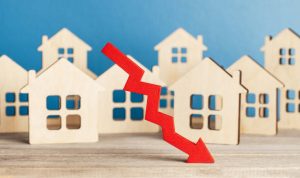Nationwide’s index reveals that the average house price dropped to £257,406, with the property market appearing to turn a corner following the September mini-budget.
 One of the UK’s major mortgage lenders reports that house prices have fallen for the sixth consecutive month, dropping 1.1% in the past year. This marks the first annual decline since June 2020, with the latest month showing the weakest decline since November 2012 at 0.5%. The average house price in February was £257,406, down from January’s £258,297, and a decline of 3.7% from the peak in August 2020.
One of the UK’s major mortgage lenders reports that house prices have fallen for the sixth consecutive month, dropping 1.1% in the past year. This marks the first annual decline since June 2020, with the latest month showing the weakest decline since November 2012 at 0.5%. The average house price in February was £257,406, down from January’s £258,297, and a decline of 3.7% from the peak in August 2020.
Bank of England data shows fifth consecutive monthly decline in mortgage approvals, dampening demand for houses
Demand for houses is being affected as mortgage approvals continue to decline. According to official figures from the Bank of England, net mortgage approvals decreased for the fifth consecutive month to 39,600 in January from 40,500 in December.
Excluding the COVID-19 pandemic period, this marks the lowest net approvals figure since January 2009 (32,400). Despite lower prices, Nationwide’s chief economist says first-time buyers still face difficulties. Mortgage payments for the average homebuyer remain higher than the long-running average share of take-home pay.
Saving for a deposit remains a struggle, especially for those in the private rented sector where rents are increasing, says Robert Gardner, Nationwide’s chief economist. Deposit requirements are still prohibitively high for many. However, if inflation moderates in the coming months, wage increases and declining house prices may improve housing affordability. Although the market instability caused by the Liz Truss mini-budget has cleared up, the housing market activity remains subdued, according to Gardner.
Double-digit inflation and mortgage upheaval trigger market uncertainty, leading to expected house price correction.
The impact of double-digit inflation and declining real wages, which outpaced pay rises, have affected market confidence. The September mini-budget and its mortgage upheaval were described as a turning point by Sarah Coles, head of personal finance at Hargreaves Lansdown. After months of painful inflation, buyers were at their limit, and the mortgage market turmoil was the final straw. A correction in house prices was expected since then.
Ms. Coles mentioned that while prices were predicted to keep decreasing, the future of the housing market remains uncertain. She posed the question of whether this is the start of modest deflation or a bubble that could burst. There’s no doubt that more price drops will occur in the following months, but overall estimates suggest a decline between 5% and 12%. Unfortunately, it’s becoming harder to stay positive about the situation.
Property Investor and mentor with over 24 years experience.
